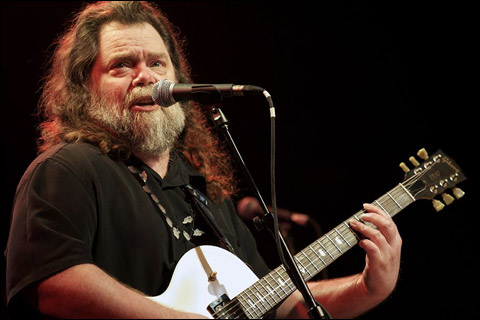
SOLO ACT “I like to play for the philosophers at concerts,” says Erickson. “But I don’t like to meet any of them.” |
After Halloween, B-movie DVD collections pop up in sale bins everywhere you look. Old Roger Corman monster movies, ancient rookie work from Scorsese, Night of the Living Dead — stuff that's either entered the public domain or slipped through significant cracks in legal paperwork that was probably questionable to begin with. They're always cheap, and their source of manufacture is as nebulous as their copyrights, so who really knows where your money's going.
Until recently, psych-rock icon Roky Erickson's recording career had followed a similar path — the '70s and '80s saw scads of releases pieced together from a few recording sessions that producers and label cronies were able to coax out of the psychologically damaged singer. Songs overlapped from album to album, and no one quite knew where the profits went. The Butthole Surfers' King Coffey released an Erickson record in 1995 on Trance Syndicate, and Coffey later said that Erickson thanked him for being the first label owner ever to hand him a check.
Erickson began as boundary-bashing singer notable for his proto-punk garage screams in Austin '60s psychedelic-rock pioneers the 13th Floor Elevators. But he became famous for his own terrifying tale of paranoid schizophrenia, too much LSD, and a stay with the electro-shock enthusiasts at Rusk State Hospital, a high-security fortress for the criminally insane. Getting out in 1972, he went on to record loads of sci-fi religious terrors like "Two Headed Dog (Red Temple Prayer)" and "Night of the Vampire," but nothing ever stuck. He lived through almost 15 years of isolation way off his meds (as detailed in the great 2005 documentary You're Gonna Miss Me) before miraculously coming out on the other side a few years ago. Now, he's got shows around the world under his belt, backed by various bands of grizzled garage vets like the Explosives, who had also backed him in '79.
The core of what might be Erickson's real fascination with horror and rock and roll and the unknown is late-night radio. "I used to listen to this station when I was a little boy," he says on the phone from Austin. "It was KEVT. They would play country music all day long, and at night, they'd come on and play a couple songs — one by Little Richard or James Brown, maybe one by Little John. I'd listen to it and get a little spooked."
Earlier this year, Erickson got the Rick Rubin/Johnny Cash treatment on a new album called True Love Cast Out All Evil (Anti-) helmed by Okkervil River's Will Sheff and built on remakes of old Erickson songs he wrote in hospitals and lonely bedrooms. It's a loving approach to what's become a touching bio, but the greatest thing about Erickson isn't how hard he tried to stir the cultural pot with clever asides and post-modern studio bait-and-switches — it's that his bonkers art flowed out of him naturally as pop songs. On the phone, he's not into talking about his vast influence on garage rock — he's interested in the Cartoon Network and Stephen King books.